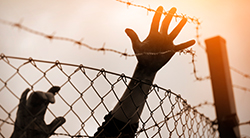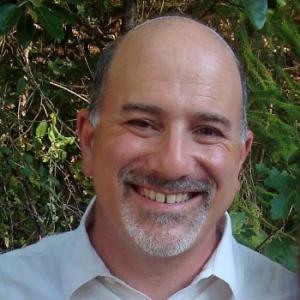
“They Say It Started Slowly”
Spoken-Word Poetry by Rabbi Paul Kipnes
They say it started slowly,
one injustice at a time.
They desensitized us quite deliberately
‘til we became partners in their crime.
They preyed upon our prejudice
against those “outsiders” in our land
whom they depicted as foreign parasites
in a conniving sleight of hand.
They moved from the rapists and the criminals
to judges, the rule of law, and the independent press,
Hammering upon our dissatisfaction
Until we also were ready to dispossess.
We ignored the times they slandered us,
Because they flattered with such skill.
We forgave the times they marginalized us,
Because our brethren were part of it, still.
We forgot that we were once like them,
hated immigrants, blackballed outsiders.
We forget how much we suffered then,
Because we’re now comfortable insiders
Are we discounting the values we professed,
those messages we should amplify?
Take care of the children, they’re our future,
Love the stranger, don’t stand idly by!
When we declared “Never again would we let it happen,”
Was that just the killing or the xenophobic mindset too?
Was it the systematic undermining of morality?
Or just that they came for me... the Jew?
They say it started slowly
That the killing came much later,
After the soil of our souls had been fertilized
By a master manipulator
[With editorial suggestions by Rabbi Steve Chester and Rabbi Laura Novak Winer]
Commentary on Spoken-Word Poetry
Parashat Mikeitz illuminates how the deep bond between Pharaoh and Joseph developed. How is it then that a new Pharaoh, who knew not Joseph, could suddenly enslave the whole Israelite people (Ex. 1:8)?
A quick reading of Mikeitz and Sh’mot (Ex 1:8) suggests the rise and fall of Egypt’s Israelite embrace occurred quickly. Yet even though the Israelites went from empowerment to enslavement in just a few parshiyot, it probably unfolded much more slowly.
The Israelite sojourn in Egypt began when Joseph’s Pharaoh embraced Joseph, listening to his dream interpretations (Gen. 41:15-32), taking his advice (Gen. 41:33-38), and investing him with incomparable responsibility (Gen. 41:39-40). When the Israelites arrived, Pharaoh himself invited them into Egypt (Gen. 45:16-20). They lived in Egypt’s Goshen suburbs, worshipping their God. Still, beyond that they must have been fully engaged in the life of Egypt, participating in its economic, social, and cultural activities (Ex. 1:7). Joseph continued successfully to guide and save the economy by managing the storing and dispersal of the produce and flocks.
How was it possible for this one man—this new Pharaoh—to so completely dislodge a community that had blended in and so positively contributed to Egypt?
Joseph surely interacted regularly and closely with the leaders, the courtiers, and the common folk of Egypt. Why did all of them, so quickly, disavow the empire-saving contributions of the Israelites’ ancestor, Joseph, and so easily follow along with Pharaoh’s conniving plan?
They say it started slowly...
The campaign probably unfolded slowly, patiently, and intentionally. It began in subtle, shocking ways, and later with overtly manipulative actions, designed to dehumanize the Israelites as “others.”
As “not us.”
Not like us.
Different.
Dangerous.
Regular Egyptians would have accepted the changing situation because they were deliberately manipulated by a masterful megalomaniac and his advisors, who played with and preyed upon their fears. Especially the fear of outsiders.
Xenophobia, fear and hatred of strangers or non-natives, is a powerful tool, because when given the choice between being insiders and outsiders, too many people will do anything to remain the former, even if it means they have to give up former friends or coworkers who were in the latter group. In Egypt, indignity upon indignity was shrewdly foisted upon the Israelites: forced labor, taskmasters set over them, embittering of their lives, and the command to kill the baby boys. It must have been an intricate and cynical campaign of xenophobia.
The Torah’s Egyptians would have employed xenophobia in the ways that other societies vanquished their supposed enemies. The darkest parts of our Jewish history were written by xenophobes who transformed our ancestors, in the eyes of their countrymen, into enemies of the people. The Spanish did it during the Inquisition. The Germans took it to new heights during the Nazi period.
But Jews have not been the only targets of xenophobia. Just ask Armenians about what happened to their ancestors during the Turkish genocide. Or Cambodians about the devastation during Pol Pot’s campaigns. Or more recently, speak to Tutsi and moderate Hutu survivors in Rwanda or the Darfuran survivors in the Sudan. Or today, the Rohingya minority in Myanmar.
We witness this intentional xenophobia at work in early American history as Native Americans were transformed into savages and all but wiped out. As African Americans, once slaves then freed, were systematically dehumanized, “scientifically” deemed inferior, denied equal opportunity by Jim Crow laws, and, more recently, adjudged as almost universally dangerous and subject to mass incarceration. Or take a look at the political manipulation of Islamophobia in Israel and in the United States. Or imagine being a 20th century immigrant Jew or any immigrant in the 21st century. You might be, like Joseph’s brethren, focused on surviving and working hard, intent on faith and family, and willing to do your part in society’s melting pot, only to be demeaned, denigrated, and condemned as the epitome of evil.
A society moves from inclusion to denigration by means of three interrelated elements: (1) an intentional campaign that distorts the perception of some group within society into hated, supposedly dangerous enemies, (2) the purposeful stoking of fear to control the majority population so that they would rather look the other way then rise up and resist, and (3) the slow disparagement of the cornerstones of society—legal, economic, social, free press, and political institutions—until society is so controlled by the disease of xenophobia that these institutions lose all authority.
But all that is ancient history.
For now, a new Pharaoh rose up who knew not Joseph, meaning that this new Pharaoh chose to ignore the deep contributions of Joseph and his family, and instead purposely cast them out of society’s good graces while simultaneously cementing his own place as the people’s protector. And while some rose up to resist, most just easily acquiesced.
Fortunately such xenophobia and the manipulation of the way we perceive other groups is a thing of the past.
Right?
Or is it...
They say it started slowly...
Rabbi Paul Kipnes, MAJE, a popular lecturer on raising spiritually balanced, emotionally whole children, is leader of Congregation Or Ami in Calabasas, CA. A former camp director and North American Federation of Temple Youth (NFTY) regional advisor, Rabbi Kipnes and his wife Michelle November, MSSW, co-wrote Jewish Spiritual Parenting: Wisdom, Activities, Rituals, and Prayers for Raising Children with Spiritual Balance and Emotional Wholeness (Jewish Lights Publishing).

Some may be shocked to read the poem that opens the commentary by Rabbi Kipnes. Some may be surprised at the overt nature of the connection he makes between our Torah portion, Mikeitz, and current events in our country. Some may be disturbed by the political nature of a moment dedicated to Torah study.
Why?
The Torah is an overtly political document. It is not simply an abstract statement of values; rather, it guides us in addressing real and practical issues. We are not asked merely to find the beauty in Torah, we are meant to live by Torah. Which means that it must, by definition, address the concerns of the people … in Greek, the “polis” (which gives us the word “politics”).
As a result, Rabbi Kipnes draws a painful parallel between the story of a Pharaoh who chose not to recognize Joseph and our disturbingly current understanding of how “society moves from inclusion to denigration.” He urges us to focus on the reckless actions of Pharaoh, but I wonder about his assertion that the ancient leader attacked “a community that had blended in and so positively contributed to Egypt.”
Without question, Mikeitz describes a Joseph who was “the first Hebrew who lived, so to speak, in Diaspora” (The Torah: A Modern Commentary, rev. ed., p. 280). Joseph assimilated in powerful ways: he adopted Egyptian customs and wore Egyptian clothes, he took an Egyptian name and an Egyptian wife, he even swore by Pharaoh’s name! He so fully assimilated that when his brothers arrived seeking food, “they did not recognize him” (Gen. 42:8).
Given this picture of Joseph—not to mention the fact that he saved Egypt from famine—it makes even less sense that the new Pharaoh “did not know Joseph” (Ex. 1:8). If the Israelites were like Joseph—blending in so completely that even their own brethren couldn’t recognize them—I’m not sure they would have been confronted as distinct from their Egyptian neighbors.
Perhaps the Israelites were not, in fact, like Joseph. Perhaps they took advantage of his position of power in order to settle as a distinct tribe within Egyptian society, maintaining the culture they valued so deeply. Returning to the text, I think we can find a subtle hint.
The Exodus narrative unfolds specifically because the Egyptians (or at least Pharaoh) did not want to deal graciously with some of the people who lived among them. But Joseph’s own brothers lament the mistake that nearly led to their own demise, when they still thought Joseph might harm them: “We are being punished … [because] we saw [our brother’s] soul’s distress when he pleaded with us, but we didn’t listen” (Gen. 42:21).
Joseph represents those who wear the trappings of power and enjoy their place in society. His brothers represent the Israelites, simple people who understood that when we don’t pay attention to the distress of the afflicted among us, bad things happen.
Whether today or long ago, when oppression does indeed begin slowly, we have the option to listen or ignore—to be Joseph or the Israelites. Which will you choose to be?
Rabbi Mark Miller is the senior rabbi at Temple Beth El in Bloomfield Hills, MI.
Mikeitz, Genesis 41:1−44:17
The Torah: A Modern Commentary, pp. 264–277; Revised Edition, pp. 267–283
The Torah: A Women’s Commentary, pp. 233–258
Haftarat Hanukkah, Zech. 4:1–7 (and I Sam. 20:18, 42 or Isa. 66:1,23)
The Torah: A Modern Commentary, p. 1,645; Revised Edition, p. 1,448
Explore Jewish Life and Get Inspired
Subscribe for Emails


